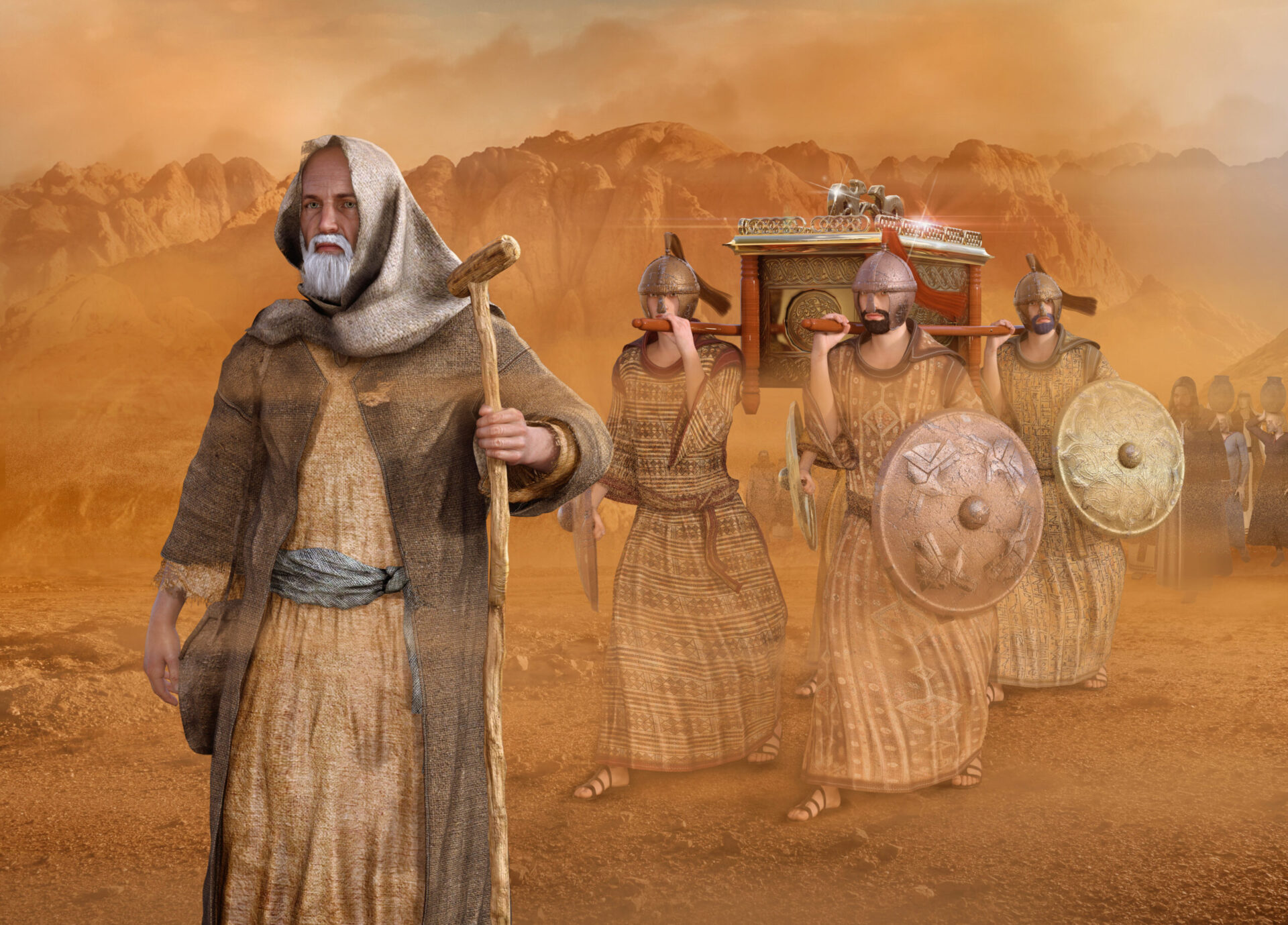Reading: Exodus 1-3, 16
For 400 years, Egypt enslaved Israel in the darkness of bondage. But God remembered his covenant with Abraham, Isaac, and Jacob. He heard his people’s cries and took action. He saved Moses, a Hebrew baby boy, from certain death, raised him to power in Egypt, then hid him in exile in Midian to prepare him for his ultimate calling, the saving of Israel. Fast forward 1,500 years; the Israelites were once again enslaved in darkness. But this time, not because of another nation, but because God had remained silent for 400 years. However, like before, God would speak through a baby, a baby named Jesus, who would save Israel and the entire world!
There are many similarities between Moses and Jesus. Just like Isaac and Joseph, Moses is a type of Christ. A type is a biblical person, thing, action, or event that foreshadows new truths and new events. A type is always like the person, thing, action, or event that it foreshadows, but it is also always greater.
We see this pattern play out in the life of Moses. Moses prophesied that God would raise a prophet like him from among the Israelites (Deuteronomy 18:15). This prophet was none other than Jesus Christ. Although Jesus is like Moses, He is also greater than Moses. The author of Hebrews confirms this by declaring that “Jesus has been found worthy of greater honor than Moses, just as the builder of a house has greater honor than the house itself” (Hebrews 3:3). Here we will examine some of the similarities between Moses and Jesus. However, for a more exhaustive list, go to learnthebible.org.
MOSES AND JESUS HAD SIMILAR CHILDHOODS
Moses and Jesus’ lives were both spared when they were babies. Because the Hebrew population in Egypt was growing rapidly, the King of Egypt ordered every Hebrew boy to be thrown in the Nile River (Exodus 1:22). Hoping her boy would be saved, Moses’ mother put him in a basket in the Nile. Her plan worked; the daughter of the King saw Moses and rescued him (Exodus 2:1-10).

Likewise, King Herod, after hearing of Jesus’ birth and the prophecy that Jesus would be king, planned to kill Jesus because he feared Jesus would later claim his throne (Matthew 2:1-12). Knowing Herod’s evil plot, an angel of the Lord warned Jesus’ family, and they took Jesus to Egypt, where they stayed until Herod died. Clearly, God was actively working in both these situations, ensuring that evil kings would not thwart his divine plans and purposes.
Other notable similarities between Moses and Jesus include: both were adopted, Moses by Pharaoh’s daughter (Exodus 2:10, Acts 7:21), and Jesus by Mary’s husband Joseph (Matthew 1:25); they were both princes: Joseph the Prince of Egypt (Exodus 2:10), and Jesus the Prince of Peace (Isaiah 9:5, Matthew 28:18, Luke 2:14.
MOSES AND JESUS WERE SENT ON A MISSION
Both Moses and Jesus were hidden away in obscurity until the time had come for them to launch their missions. No one would have guessed the greatness they were destined for. Before their calling, they spent time in the wilderness, Moses 40 years tending to his father-in-law’s sheep, Jesus, 40 days being tempted by the devil.
God commissioned both Moses and Jesus in undeniable ways: Moses from a burning bush (Exodus 3), and Jesus by the Holy Spirit visibly descending on him (Luke 3:22). The goal of both of their missions was rescue and deliverance. Moses’ mission was to go to Egypt and deliver the Israelites from their bondage to Egypt (Exodus 3:10). Jesus’ mission was to go to the world and deliver it from its bondage to sin and death (John 3:16).
Both Moses and Jesus recruited others to help them in their pursuits. Moses sent out 12 spies to explore the promised land. Jesus sent out twelve disciples, not to just explore the promised land but to spiritually inhabit it.
MOSES & JESUS WERE TO SAVE PEOPLE THAT REJECTED THEM
Although Moses was raised an Egyptian and had all the privileges of royalty, his heart remained with the Hebrew people. When he was 40 years old, he saw an Egyptian beating a Hebrew. He came to the Hebrew’s aid killing the Egyptian. Later, Moses saw two of his people arguing, tried to intervene, but they rejected his overtures and asked Moses, “Who made you ruler and judge over us?” (Exodus 2:14) Moses mistakenly thought that his people would realize that God was using him to rescue them, but they did not (Acts 7:25).
Jesus also felt the sting of rejection from His people. He came to save Israel’s lost sheep first (Matthew 10:5-6), but John tells us that His own did not receive Him (John 1:11).
After the Jewish people rejected Moses and Jesus, they turned to the Gentiles. Moses fled Egypt to Midian, Gentile land where he married a Gentile woman and remained for 40 years. Jesus, although He came to save Israel first, still ministered to a few Gentiles. He also told his disciples that he had other sheep that were not of their fold, but that he planned to bring them along to be one flock and one shepherd (John 10:16). He, of course, was speaking of the Gentiles. After his death and resurrection, He instructed his disciples to take the His message, the Gospel, to the Jew and Gentile alike (Matthew 28:16-20).
MOSES AND JESUS SUSTAINED THEIR PEOPLE
Moses and Jesus both fed hungry people through miraculous means. During the Israelites’ wandering in the desert, God provided manna in the morning and meat in the evening (Exodus 16). Jesus fed 5,000 and then 4,000 by multiplying bread and dividing fish (Mark 6:30-44, Mark 8:1-10). Not only did Jesus meet the physical need for food of the people, but He is the ultimate hunger-taker. He is the bread of life, the only One that can forever satisfy our spiritual hunger because by his Word, whoever comes to Him will never become hungry (John 6:35).
Both Moses and Jesus provided life-giving water to thirsty people. Moses struck a rock in the wilderness, and from that rock flowed water for the thirsty Israelites (Exodus 17:1-7). Jesus is that rock that was stricken! (1 Corinthians 10:4) Because He was struck on the cross from Him flowed streams of living water so that whoever drinks of that water will never thirst (John 4:14).
MOSES AND JESUS: INTERCESSORS AND LAW-GIVERS
Moses received the Law from God on Mt. Sinai and mediated it to the Israelites under the old covenant (Exodus 20). On the Mount of the Beatitudes, Jesus mediated the deeper and truer meaning of the law as fulfilled by Him, bringing it back to its original meaning (Matthew 5).

Moses, on many occasions, cried out to God on Israel’s behalf, asking God to have mercy on them. One such instance was when Moses found the Israelites worshiping a golden calf (Exodus 32). Moses appealed to God on Israel’s behalf and God withheld His judgment. Jesus also intercedes for us (Romans 8:34). He stands on our behalf in front of the Father and pleads our case (1 John 2:1).
CONCLUSION
Moses and Jesus willingly exchanged their royal privileges and power for hardship and servitude all because of a mission that was bigger than themselves, a mission that would first bring salvation to the Israelites and then to the entire world. Despite a world that set itself up against them, they held fast and did not deviate from their purpose. Because of their obedience to the Father, and their unrelenting love the Light has come to us and the Lord rises upon us and His glory appears over us! (Isaiah 60:1)
Author
-
I am a truth seeker by nature. My passion is studying God's Word and sharing His Truth with others.
View all posts





4 Responses